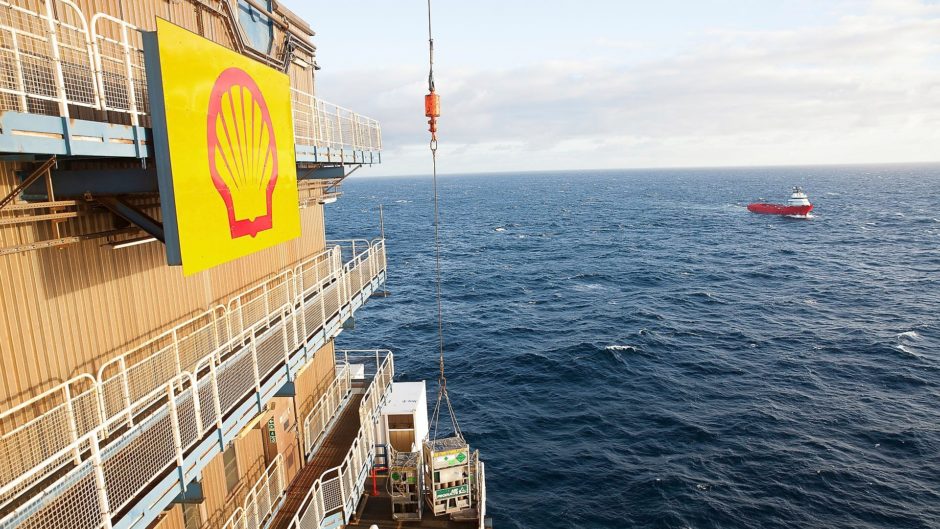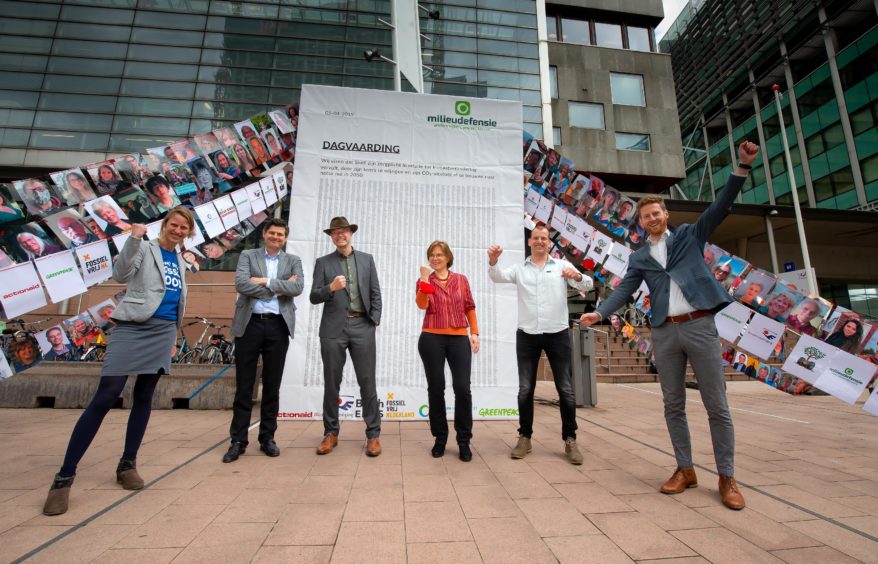
“For Shell, this ruling does not mean a change but rather an acceleration of our strategy,” said Ben van Beurden, the chief executive of Shell.
Credit...Benoit Tessier/Reuters
By Stanley Reed
By Stanley Reed
NY TIMES
June 9, 2021
Royal Dutch Shell will respond to a recent defeat in a Dutch court by accelerating its efforts to reduce its carbon dioxide emissions, the company’s leader said Wednesday.
Ben van Beurden, the chief executive of Shell, said that he was “disappointed” by the ruling requiring the oil company, Europe’s largest, to move faster in slashing greenhouse gases, but added that the company was planning to do just that.
“For Shell, this ruling does not mean a change but rather an acceleration of our strategy,” Mr. van Beurden said in an article published on LinkedIn. “We will seek ways to reduce emissions even further in a way that remains purposeful and profitable,” he added.
On May 26, the District Court in The Hague ruled that Shell must reduce its global net carbon emissions by 45 percent, by 2030 compared with 2019. The court said that Shell owed a duty of care to the citizens of the Netherlands, where the company has its headquarters, to protect them from the consequences of global warming like rising sea levels.
Mr. van Beurden said his first reaction to the ruling was “surprise” because Shell had been in the forefront among oil majors in setting out targets to reduce emissions including those of the customers who burn the company’s products in their cars or jet engines. He also said that if Shell decided to stop selling gasoline and diesel today, people would just turn to other providers for fuel. “It would not help the world one bit,” he said.
Mr. van Beurden said that Shell still expected to appeal the judgment.
After reflection, though, Mr. van Beurden said he and his colleagues also felt “a determination to rise to the challenge” posed by the court.
The Shell executives may have realized that the ruling is a harbinger of increased pressures to come and that Shell, which has a long history dating to the 19th century, needs to do more on climate change if it wants to thrive in future decades.
Stanley Reed has been writing from London for The Times since 2012 on energy, the environment and the Middle East.
June 9, 2021
Royal Dutch Shell will respond to a recent defeat in a Dutch court by accelerating its efforts to reduce its carbon dioxide emissions, the company’s leader said Wednesday.
Ben van Beurden, the chief executive of Shell, said that he was “disappointed” by the ruling requiring the oil company, Europe’s largest, to move faster in slashing greenhouse gases, but added that the company was planning to do just that.
“For Shell, this ruling does not mean a change but rather an acceleration of our strategy,” Mr. van Beurden said in an article published on LinkedIn. “We will seek ways to reduce emissions even further in a way that remains purposeful and profitable,” he added.
On May 26, the District Court in The Hague ruled that Shell must reduce its global net carbon emissions by 45 percent, by 2030 compared with 2019. The court said that Shell owed a duty of care to the citizens of the Netherlands, where the company has its headquarters, to protect them from the consequences of global warming like rising sea levels.
Mr. van Beurden said his first reaction to the ruling was “surprise” because Shell had been in the forefront among oil majors in setting out targets to reduce emissions including those of the customers who burn the company’s products in their cars or jet engines. He also said that if Shell decided to stop selling gasoline and diesel today, people would just turn to other providers for fuel. “It would not help the world one bit,” he said.
Mr. van Beurden said that Shell still expected to appeal the judgment.
After reflection, though, Mr. van Beurden said he and his colleagues also felt “a determination to rise to the challenge” posed by the court.
The Shell executives may have realized that the ruling is a harbinger of increased pressures to come and that Shell, which has a long history dating to the 19th century, needs to do more on climate change if it wants to thrive in future decades.
Stanley Reed has been writing from London for The Times since 2012 on energy, the environment and the Middle East.
Shell ready to ‘rise to challenge’ of court ruling, CEO expects to appeal verdict
Shell’s CEO has said it will “rise to the challenge” after the supermajor was ordered by a Dutch court to drastically cut its emissions.
By Hamish Penman
09/06/2021,
l
By Hamish Penman
09/06/2021,
l

Shell's Nelson platform in the North Sea.
Shell’s CEO has said it will “rise to the challenge” after the supermajor was ordered by a Dutch court to drastically cut its emissions.
But Ben van Beurden said the landmark ruling has not impacted the fact that Shell is “more determined than ever” to play its part in tackling climate change.
He also confirmed that Anglo-Dutch company is reviewing the judgement and expects to appeal it.
A court in the Hague recently ordered Shell to cut its net carbon emissions by 45%, compared to its 2019 level.
The case, which was brought forward by Friends of the Earth Netherlands (Milieudefensie), was hailed as a momentous win for environmental groups.
As a result of the verdict, Shell will have to ramp up its decarbonisation agenda, though there are likely to be future court battles over the case.

Shell’s CEO has said it will “rise to the challenge” after the supermajor was ordered by a Dutch court to drastically cut its emissions.
But Ben van Beurden said the landmark ruling has not impacted the fact that Shell is “more determined than ever” to play its part in tackling climate change.
He also confirmed that Anglo-Dutch company is reviewing the judgement and expects to appeal it.
A court in the Hague recently ordered Shell to cut its net carbon emissions by 45%, compared to its 2019 level.
The case, which was brought forward by Friends of the Earth Netherlands (Milieudefensie), was hailed as a momentous win for environmental groups.
As a result of the verdict, Shell will have to ramp up its decarbonisation agenda, though there are likely to be future court battles over the case.

© Photographer: Jason Alden/BloombergShell CEO Ben van Beurden.
Reacting to the judgement, Mr Van Beurden said: “My first response was surprise. After all, Shell has set the pace in our industry by taking responsibility for reducing all our carbon emissions: not just those we produce ourselves, but also those produced when our customers use the energy products we sell, for example, to drive their cars, power their businesses and heat their homes. Over 90% of the emissions we are responsible for come from the use of the products we sell.
“I also questioned the ruling and its implications. We are carefully reviewing the court’s judgment and the challenges it presents, and we expect to appeal. Some two weeks on, I still feel disappointed that Shell is being singled out by a ruling that I believe does not help reduce global CO2 emissions.
“But, along with my colleagues, I feel something else: a determination to rise to the challenge.”
Despite the prospect of an appeal looming, the court has said its decision applies immediately and should not be suspended in the event of future court battles.
For Shell, that “does not mean a change”, rather an “acceleration” of its strategy to become a net-zero emissions business by 2050, Mr van Beurden said.
He added: “We have set rigorous, short-term reduction targets along the way to make sure we achieve net zero.
“But now we will seek ways to reduce emissions even further in a way that remains purposeful and profitable. That is likely to mean taking some bold but measured steps over the coming years.
“In April this year we published our detailed Energy Transition Strategy. And in May, we became the first energy company to put its energy transition strategy to a vote of shareholders at our Annual General Meeting. It won 89% support. We will give our shareholders a chance to vote on our progress every year.
“The court did not consider this because the hearing that led to the ruling took place several months before we published this strategy and, of course, before major investors demonstrated their support at the AGM.”

Reacting to the judgement, Mr Van Beurden said: “My first response was surprise. After all, Shell has set the pace in our industry by taking responsibility for reducing all our carbon emissions: not just those we produce ourselves, but also those produced when our customers use the energy products we sell, for example, to drive their cars, power their businesses and heat their homes. Over 90% of the emissions we are responsible for come from the use of the products we sell.
“I also questioned the ruling and its implications. We are carefully reviewing the court’s judgment and the challenges it presents, and we expect to appeal. Some two weeks on, I still feel disappointed that Shell is being singled out by a ruling that I believe does not help reduce global CO2 emissions.
“But, along with my colleagues, I feel something else: a determination to rise to the challenge.”
Despite the prospect of an appeal looming, the court has said its decision applies immediately and should not be suspended in the event of future court battles.
For Shell, that “does not mean a change”, rather an “acceleration” of its strategy to become a net-zero emissions business by 2050, Mr van Beurden said.
He added: “We have set rigorous, short-term reduction targets along the way to make sure we achieve net zero.
“But now we will seek ways to reduce emissions even further in a way that remains purposeful and profitable. That is likely to mean taking some bold but measured steps over the coming years.
“In April this year we published our detailed Energy Transition Strategy. And in May, we became the first energy company to put its energy transition strategy to a vote of shareholders at our Annual General Meeting. It won 89% support. We will give our shareholders a chance to vote on our progress every year.
“The court did not consider this because the hearing that led to the ruling took place several months before we published this strategy and, of course, before major investors demonstrated their support at the AGM.”

Milieudefensie celebrates a win over Shell on May 26, 2021
Photo: Bart Hoogveld
Mr van Beurden also reinforced the industry’s message that oil and gas will be part of the picture for decades to come.
He also warned of the possible implications of companies calling time on hydrocarbon production.
“To mention one, perhaps extreme scenario, imagine Shell decided to stop selling petrol and diesel today. This would certainly cut Shell’s carbon emissions. But it would not help the world one bit. Demand for fuel would not change. People would fill up their cars and delivery trucks at other service stations,” Mr van Beurden said.
As it stands, Shell has free reign to decide how it wishes to cut its carbon emissions, with divesting carbon intense assets offering an easy solution.
But analysts have warned that this could lead to an increase in global emissions as assets fall into the hands of smaller operators with less experience.
Mr van Beurden said the decision by the court to single out one energy company is “not the answer” to tackling climate change.
He said Shell should work with its customers to help them “find their own pathways” to hitting net zero, thereby helping to “grow demand for new low-carbon products”.
Mr van Beurden added: “For companies to invest successfully, they also need bold, clear, and consistent government policies and regulations. Greater collaboration between governments, companies and customers will allow us and others to build up our low-carbon energy businesses in the fastest way.
“Nevertheless, a court has ordered us to go even faster. Shell is a great company with a long history of rising to the most difficult challenges. We may disagree with this order, but we will continue to embrace the leading role we must play in helping to develop a low-carbon energy system. This is another challenge we will rise to.”
Mr van Beurden also reinforced the industry’s message that oil and gas will be part of the picture for decades to come.
He also warned of the possible implications of companies calling time on hydrocarbon production.
“To mention one, perhaps extreme scenario, imagine Shell decided to stop selling petrol and diesel today. This would certainly cut Shell’s carbon emissions. But it would not help the world one bit. Demand for fuel would not change. People would fill up their cars and delivery trucks at other service stations,” Mr van Beurden said.
As it stands, Shell has free reign to decide how it wishes to cut its carbon emissions, with divesting carbon intense assets offering an easy solution.
But analysts have warned that this could lead to an increase in global emissions as assets fall into the hands of smaller operators with less experience.
Mr van Beurden said the decision by the court to single out one energy company is “not the answer” to tackling climate change.
He said Shell should work with its customers to help them “find their own pathways” to hitting net zero, thereby helping to “grow demand for new low-carbon products”.
Mr van Beurden added: “For companies to invest successfully, they also need bold, clear, and consistent government policies and regulations. Greater collaboration between governments, companies and customers will allow us and others to build up our low-carbon energy businesses in the fastest way.
“Nevertheless, a court has ordered us to go even faster. Shell is a great company with a long history of rising to the most difficult challenges. We may disagree with this order, but we will continue to embrace the leading role we must play in helping to develop a low-carbon energy system. This is another challenge we will rise to.”
No comments:
Post a Comment